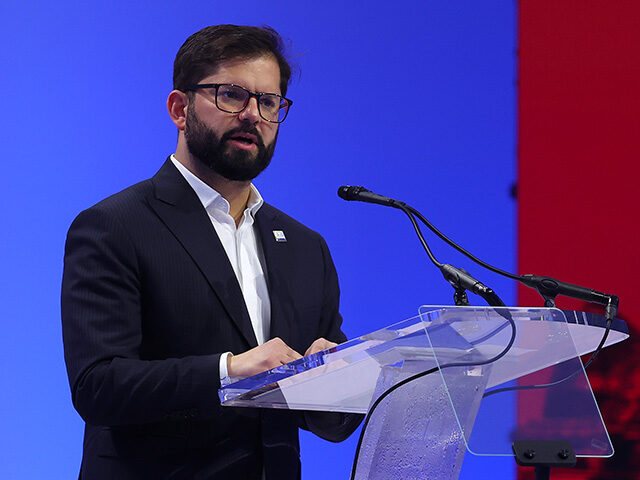Radical leftist President Gabriel Boric of Chile announced a plan on Thursday to deport illegal immigrants from the country who did not register with Santiago’s biometric registration program by the end of the year, declaring his government would “be inflexible” in deportations and promising, “we will kick them out.”
Boric made the announcement at an event alongside the Ministry of the Interior and the Carabineros, Chile’s law enforcement officials, to introduce a new “Plan for Strengthening Focused Territorial Control,” a broad series of provisions to prevent mass migration outside legal entry into the South American nation.
According to a report published in September by the nation’s investigative police division, Chile has seen the entry of an estimated 35,000 illegal immigrants throughout 2023. The report estimated that over 50,000 illegal immigrants would enter the country by the end of the year. The vast majority of migrants to Chile, legal and otherwise, come from northern Venezuela, home to the largest migrant crisis in the history of the Western Hemisphere. Venezuela has lost nearly 7 million people since brutal socialist dictator Nicolás Maduro took power a decade ago, though the volume of refugees fleeing increased significantly during the deadly regime crackdowns that began in 2014.
Venezuelans in other Latin American countries have vehemently denounced socialist parties and supported conservative movements. In neighboring Argentina, for example, Venezuelans waved their flags and celebrated alongside supporters of libertarian President-elect Javier Milei following his decisive victory against socialist candidate Sergio Massa on November 19.
Boric is a hardline socialist who has described his ideology as “to the left of the PC [the Communist Party].” His declaration that his government would be “inflexible” with illegal immigrants follows months of low approval ratings and public dissatisfaction with his time in office. A poll by the firm CEP published on November 20 found that only 26 percent of Chileans approved of Boric on the job, while 61 percent disapproved, eight percent were indifferent, and five percent said they didn’t know.”
“I want to say that, in this government, in conjunction with the police, we will be inflexible,” Boric declared. “Whoever has an order of detention pending will be detained. In the same vein, foreigners who have an order of deportation will be detained and deported in the next five days.”
“Whoever is in Chile, irregularly, we are kicking them out,” Boric emphasized.
Boric claimed that the measures were necessary to maintain security in northern Chile, where the nation’s especially porous border with Bolivia lies, and the measures sought “to retake control of these places and will be accompanied with coordination with the investigative police to control migration and eventually deport whoever is detained.”
Those excepted from deportations, Boric said, would be those who registered with the government’s biometric system, debuting in June and used to be able to identify criminals if a crime took place. About 127,000 illegal immigrants have registered with the government’s system, the Agence France-Presse (AFP) reported this week.
Boric’s tough rhetoric with illegal immigrants differs significantly from his approach to the issue before assuming the presidency in 2022. In response to the new measures, Chileans began circulating a post Boric published on Twitter in 2018, in which he declared, “Nop[e], I don’t have problems with undocumented immigrants.”
“I think we should take them in, give them opportunities, and treat them as the equals they are,” Boric wrote at the time.
Nop. No tengo problemas con inmigrantes sin papeles. Creo que debemos acogerlos, darles oportunidades y tratarlos como los iguales que son.
— Gabriel Boric Font (@GabrielBoric) February 27, 2018
Following his inauguration, Boric insisted that Chile should be sensitive to giving immigrants legal pathways to live in the country, as many leftists fled the country and settled around the world during the military regime of Gen. Augusto Pinochet. He did, however, dismiss the possibility of a “mass amnesty,” stating that it would be “a strategic error on our part, it is inappropriate.”
On November 22, Boric teased this week’s announcement by stating that he would soon announce a new deportation plan, but urged the public not to demonize migrants.
“There are migrants who commit crimes, yes; the number of crimes rose as a product of imported delinquency, yes,” he admitted, adding, “but it is very unfair to lump them all together.”
“We are giving an opportunity to those who work in an honest way to register and begin a regularization process,” he assured.
The Spanish newspaper El País reported following the late November declaration that Boric was facing significant pressure from the Chilean right to address the rapidly growing numbers of illegal immigrants in the country. The National Renovation Party, a right-wing party, reportedly threatened to begin impeachment procedures against Boric’s Interior Minister Caroliná Tohá if Boric did not deport over 12,000 illegal immigrants by the end of 2023.
Boric responded to the demand by complaining that Chilean conservatives did not deport the 12,000 during the pro-China, “center-right” administration of his predecessor, Sebastián Piñera; conservative leaders replied that Boric was in the Chilean Congress at the time and part of a left-wing bloc that took legal action to prevent the deportations.
Follow Frances Martel on Facebook and Twitter.

COMMENTS
Please let us know if you're having issues with commenting.